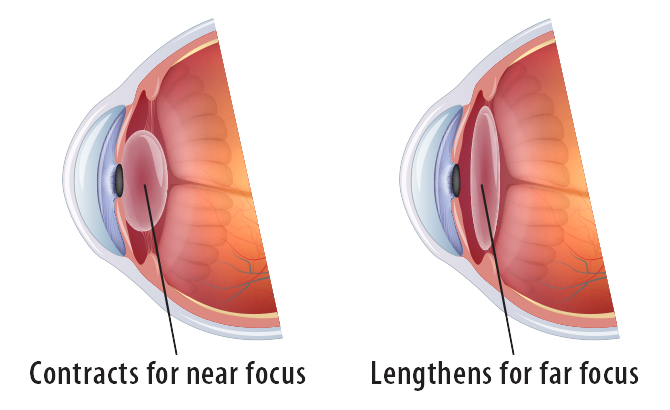Near Vision Decline (Presbyopia)
Why do we need reading glasses?
When we are in our 20s, our natural lens is clear and elastic. It is able to change its shape to focus on objects at different distances, much like a camera lens. However, as we reach our 40s and 50s, we begin to lose our ability to focus up close without reading glasses. This gradual loss of near vision is called presbyopia, and it is due to changes in the natural lens of our eye.
Presbyopia is a condition that progressively worsens. At first, we generally start requiring reading glasses in low light conditions only, but over time this shifts to requiring reading glasses at all times. With further passage of time, the need for reading glasses might turn into needing bifocals for near and distance viewing. The lens in our eyes will eventually begin to cloud and form a cataract, which causes vision loss uncorrectable by glasses and contacts.
What is Presbyopia?
The natural crystalline lens in the eye is quite elastic and can change its shape to focus on objects at various distances, this is known as “accommodation.” As we age, the lens becomes more rigid and seeing up-close objects clearly becomes difficult. This condition, known as presbyopia, is part of the normal aging process of the eye.
You may start to notice presbyopia around your mid-40s. Reading materials might have to be held farther away to be seen clearly. There is no way to stop or reverse presbyopia but it can be corrected with eyeglasses, contact lenses, or vision correction surgery such as a refractive lens exchange.

How Can Presbyopia Be Treated?
Presbyopia can be corrected by a Refractive Lens Exchange (RLE) procedure at Price Vision Group. While years ago it made sense to wait until a cataract formed to have surgery, recent advancements in technology have now made it worthwhile to consider having your lens replaced to fix presbyopia. Extended Depth of Focus (EDOF) lens implants give patients the option to no longer require glasses or contacts by restoring the ability of our eye to have extended depth of focus!
Find out if you are a candidate, schedule a free screening with us today at 317-814-2933 or request an appointment online.
Refractive Surgery for Presbyopia Correction
LASIK, PRK, and Refractive Lens Exchange (RLE) often produce results that are better than 20/20, and liberate patients from the discomfort, expense, and hassle of corrective lenses.
At Price Vision Group, we feature three internationally renowned corneal specialists, who are also authorities in the field of LASIK and other ophthalmic surgeries. Our surgeons travel the world to teach their techniques to their peers, and our reputation draws patients from across the country.

